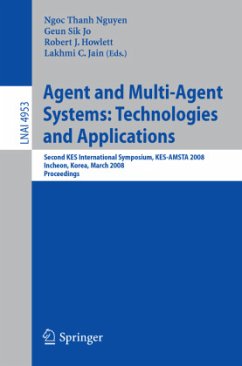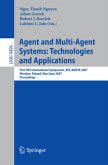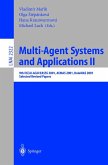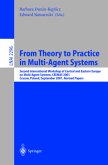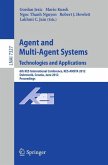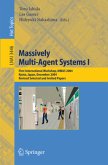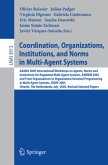This book constitutes the refereed proceedings of the Second International Symposium on Agent and Multi-Agent Systems - Technologies and Applications, KES-AMSTA 2008, held in Incheon, Korea, in March 2008.
The 91 revised papers presented were carefully reviewed and selected from numerous submissions and contain 10 papers from the doctoral track, and 12 papers from 2 special sessions. The papers are organized in topical sections representing the following conference tracks: methodological aspects of agent systems, agent-oriented Web applications, ontology management, multi-agent resource allocation, cooperation, coordination, and teamwork, agents for network management, multi-agent learning, mobile agents, agents in applications; doctoral track; special sessions on self-organization in multi-agent systems and on intelligent and secure agent for digital content management.
Following from the very successful First KES Symposium on Agent and Multi-Agent Systems - Technologies and Applications (KES-AMSTA 2007), held in Wroclaw, Poland, 31 May-1 June 2007, the second event in the KES-AMSTA symposium series (KES-AMSTA 2008) was held in Incheon, Korea, March 26-28, 2008. The symposium was organized by the School of Computer and Information Engineering, Inha University, KES International and the KES Focus Group on Agent and Mul- agent Systems. The KES-AMSTA Symposium Series is a sub-series of the KES Conference Series. The aim of the symposium was to provide an international forum for scientific research into the technologies and applications of agent and multi-agent systems. Agent and multi-agent systems are related to the modern software which has long been recognized as a promising technology for constructing autonomous, complex and intelligent systems. A key development in the field of agent and multi-agent systems has been the specification of agent communication languages and formalization of ontologies. Agent communication languages are intended to provide standard declarative mechanisms for agents to communicate knowledge and make requests of each other, whereas ontologies are intended for conceptualization of the knowledge domain. The symposium attracted a very large number of scientists and practitioners who submitted their papers for nine main tracks concerning the methodology and applications of agent and multi-agent systems, a doctoral track and two special sessions.
The 91 revised papers presented were carefully reviewed and selected from numerous submissions and contain 10 papers from the doctoral track, and 12 papers from 2 special sessions. The papers are organized in topical sections representing the following conference tracks: methodological aspects of agent systems, agent-oriented Web applications, ontology management, multi-agent resource allocation, cooperation, coordination, and teamwork, agents for network management, multi-agent learning, mobile agents, agents in applications; doctoral track; special sessions on self-organization in multi-agent systems and on intelligent and secure agent for digital content management.
Following from the very successful First KES Symposium on Agent and Multi-Agent Systems - Technologies and Applications (KES-AMSTA 2007), held in Wroclaw, Poland, 31 May-1 June 2007, the second event in the KES-AMSTA symposium series (KES-AMSTA 2008) was held in Incheon, Korea, March 26-28, 2008. The symposium was organized by the School of Computer and Information Engineering, Inha University, KES International and the KES Focus Group on Agent and Mul- agent Systems. The KES-AMSTA Symposium Series is a sub-series of the KES Conference Series. The aim of the symposium was to provide an international forum for scientific research into the technologies and applications of agent and multi-agent systems. Agent and multi-agent systems are related to the modern software which has long been recognized as a promising technology for constructing autonomous, complex and intelligent systems. A key development in the field of agent and multi-agent systems has been the specification of agent communication languages and formalization of ontologies. Agent communication languages are intended to provide standard declarative mechanisms for agents to communicate knowledge and make requests of each other, whereas ontologies are intended for conceptualization of the knowledge domain. The symposium attracted a very large number of scientists and practitioners who submitted their papers for nine main tracks concerning the methodology and applications of agent and multi-agent systems, a doctoral track and two special sessions.

